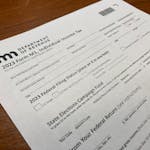"Follow the Fed" has proven to be a relatively simple and successful investment strategy, but keeping up with the latest developments at our nation's central bank isn't as straightforward as it used to be.
Wondering when the Federal Reserve will raise interest rates is the usual inquiry. The uncertain timing of rate changes is a variable financial markets have grown accustomed to. The next few months, however, will also reveal answers to many other Fed questions.
The details of Fed tapering will be learned first. For most of the last 18 months the Fed has been buying at least $120 billion of bonds per month, but that pace will soon slow.
Reports suggest the titanic scope of current stimulus — roughly $750 million for every hour U.S. markets are open — will decrease by $15 billion per month, meaning smaller amounts of bond-buying will continue through next summer. The Fed's liquidity injections will moderate, but policy should remain accommodative to the economy (and to markets) for at least another nine months.
Inevitable increases to the Fed funds rate will come next, though it's not clear whether the Fed intends to eliminate all asset purchasing before raising rates or will juggle both changes concurrently.
Taking precautions to avoid spooking markets is something Fed Chair Jerome Powell has excelled at, so we can bet whatever the Fed's strategy is for rate hikes will be articulated before its implementation. Powell's track record suggests he will wait as long as possible to raise rates, but with inflation pressures building, a policy change could come sooner than the consensus projects.
It's no exaggeration to say that Powell in the last four years has been one of the most powerful people on the planet, but his time in the spotlight may not last much longer. His four-year term as Fed chair will expire in February and it's not clear whether President Joe Biden will reappoint Powell or replace him.
Powell's tenure is generally viewed favorably, in large part based on the Fed's unprecedented response to the global pandemic and subsequent economic recovery it helped trigger.
Biden may, however, appoint a new chair for entirely political reasons, either because it's popular to remove someone selected by your predecessor (Trump) or to appease members of his own party calling for a change in Fed leadership. While economists debate the merits of Powell's inflation outlook, the joke on Wall Street is that Powell himself may prove to be transitory.
The fact that three Fed officials have admitted to a legalized form of insider trading casts an additional cloud of uncertainty over America's most prominent financial institution. Two Fed presidents have already resigned after reports they bought and sold investments in personal accounts based on knowledge of non-public information. A third Fed executive is facing pressure to do the same.
Powell has begun a review of internal Fed policies and new regulations eventually may be imposed by Congress. In the meantime, resignations bring larger turnover among Fed leadership and with it, a potential new approach.
That could spur some volatility in markets, which prefer the status-quo to uncertainty. In this case, however, we expect Biden's new Fed appointments will be supportive of modern monetary theory and other dovish policies favored by liberals.
Looming changes at the Fed, in other words, might just bring more of the same.
Ben Marks is chief investment officer at Marks Group Wealth Management in Minnetonka. He can be reached at ben.marks@marksgroup.com. Brett Angel is a senior wealth adviser at the firm.




